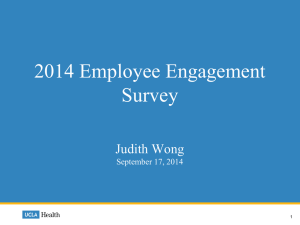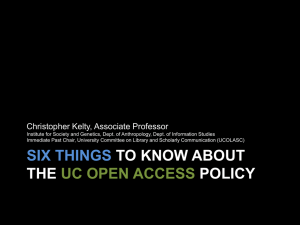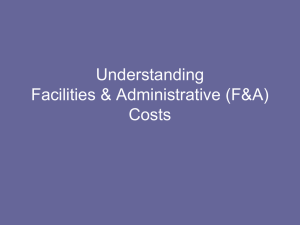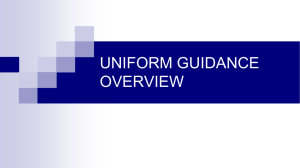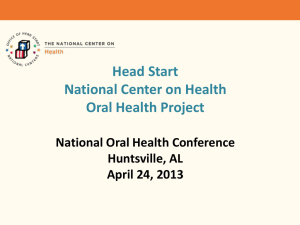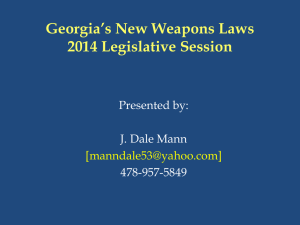How Much is Enough? Budgeting for Your Project and OCGA Forms
advertisement
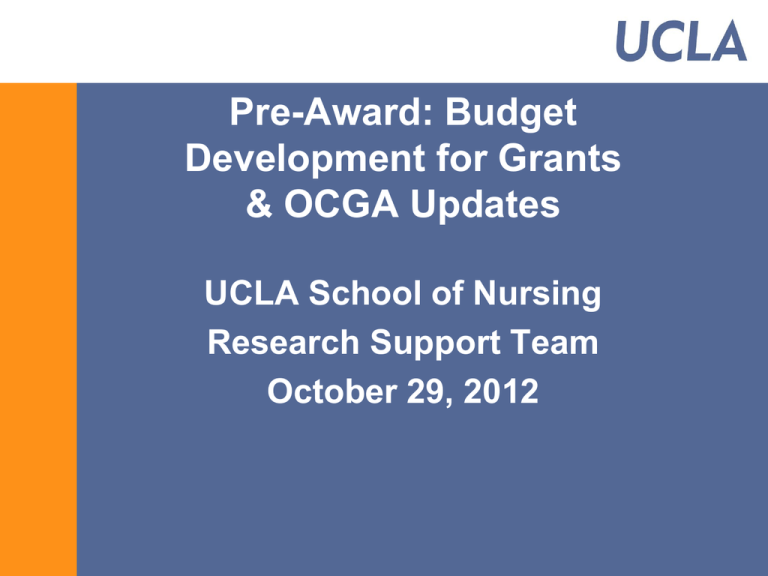
Pre-Award: Budget Development for Grants & OCGA Updates UCLA School of Nursing Research Support Team October 29, 2012 The Purpose of Budgets Demonstrate that PI has considered all costs of achieving the specific aims and project goals Dedicate effort and resources to the project Delineate budget categories which must be adhered to (±25%) once the project is underway Describe the scientific necessity of every line item Timeline for Successful Budgets Three months before due date Develop Specific Aims Meet with Statistics Consultation Group to develop power analysis and study size, statistician effort (if applicable), data management plan Develop project timeline What is the project duration? Who is involved? Does effort fluctuate? Enrollment timeline? Analysis timeline? Timeline for Successful Budgets Two months before due date Identify personnel and performance sites Rough draft of budget and justification One month before due date Final budget and justification Timeline for Successful Budgets Secure special arrangements earlier Permission to exceed direct cost limitation? Subawards to other Institutions? Projects with an international component? Quotes for equipment, consultants, vendor agreements? Mandatory cost sharing? Program income? Budget Foundations Justification Describe necessity Cost categories Effort, subcontracts, other costs Project goals & specific aims What is feasible/necessary to achieve goals? Program announcement Scope? Cost/category limitations? Modular or line item budget? Direct and Indirect costs Direct Costs identified with a particular sponsored project and directly assigned to that project with a high degree of accuracy Examples: scientific/technical personnel effort, project supplies, subject renumeration, scientific/technical computers Indirect Costs For common or joint objectives which cannot be identified specifically with a particular project Examples: clerical effort, office supplies, general purpose computers Direct Cost Categories Personnel: define effort devoted to the project Materials and supplies Travel (PI to study sites, conferences) Consultants Equipment Subawards Other costs Define categories and atypical line items at outset to ensure allowability when project is underway Subject renumeration, TIF, fee remission, animal research, pharmacy costs, rent, project-specific office-type supplies, telephones, mailing, copying, machines (<5k), core services Personnel Determinations Personnel comprise the largest part of grant budgets 2% escalation per NOT-OD-11-068 All personnel have a project role, duties, and effort Senior/Key Personnel individuals who contribute to the scientific development or execution of the project in a substantive, measurable way Current staff or TBN? Actual salary/benefits vs institutional scales Project roles: Senior/Key Multiple PI Requires Multiple PI leadership plan Co-Investigator Requires stated effort/salary Faculty Collaborator Other Significant Contributor Effort is “as needed” Subaward, Vendor or Consultant? Subawards are the most common mechanism for collaboration with another site that brings intellectual value to the project. They have discrete, fully-formed budgets authorized by an institutional official. Vendor Agreements are established when a site performs work (assays, sample processing) on a feefor-service basis. No intellectual contribution. Consultants are non-UCLA individuals who perform fee-for-service work at a fixed rate; always requires a letter of support stating the rate, scope and expertise; compliant with SB1467 “Public Contracts: Conflict of Interest.” Human and Animal Subjects Protocol defines timepoints and processes for subject renumeration which must be included in the budget Approvals must be in place before award can be issued Start work on the protocol before award is issued to ensure the project is not delayed or restricted Financial Characteristics of Contracts & Grants Defined performance period Ongoing reporting – progress, effort and technical reports Auditable financial reports Financial Characteristics of Contracts & Grants Most research grants are cost-reimbursable Specific scope of work Unobligated funds returned to agency Some contracts (clinical trials, subcontracts for services) are fixed-rate Funds provided for services rendered Unobligated funds retained under Policy 913 Research Office will advise PI regarding the contract type Federal Costing Principles OMB A-21 Should I charge this to my grant? Allowability- Does the agency or announcement prohibit certain costs? Allocability-Is the expense tied directly and proportionally to the project? Reasonableness- Are the cost and units reasonable in light of the study aims and scope of work? Consistency- Are the costs consistent across projects and campus units? OMB A-110 Competitive procurement Report submission and records retention Prior approval for rebudgeting beyond established thresholds Managing Project Expenses Partnership between PI, requestor, purchaser and grant analyst to adhere to principles and facilitate timely correction Continuous, dynamic, collaborative review Review Process Research Office provides ad hoc, real-time reports on expenditures PI defines steps to align expenses with budget and goals Fund manager and requester take action Repeat Managing Project Expenses By approving a purchase, PI certifies that the expense is necessary, directly benefits and is used exclusively for the project Use exception processes sparingly or never Out-of-pocket expenses, cost transfers, solesource purchases Expenses >90 days old cannot be moved to or between research projects (NIH GPS 7.5) Examples of reporting flags Categorical variances ± 25% Rebudgeting into/out of IDC-exclusion categories Effort variances Unallowable/misattributed items Carryforward >25% to continuation year Reporting Effort reports PI submits reports quarterly Prevents overlap and ensures effort is consistent with stated levels Personnel effort must be ≥ pay Prior approval required if senior/key effort decreases >25% from proposed effort Three reporting points: Other Support page, All Personnel Report, Effort Reporting System Reporting Progress reports Submitted to agency annually to secure continuation funding Publications? Results? Project delays? Changes to project? Enrollment? Effort? Carryforward over threshold? Sloppy reports are frequently returned and will delay continuation funding Pre-Award: OCGA Updates UCLA School of Nursing Research Support Team October 29, 2012 OCGA Reorganization Proposal and Award Intake Teams Created Grant Analysts Grants and Cooperation Agreements Grant Officers Contracts, Incoming Subs, and Multi Campus Agreements New Assistant Director Grants and Cooperative Agreements OCGA Proposal Intake Process Proposal Intake Team receives all proposals to review Team reviews documents for completeness Complete application Minimum documents Less than minimum some level of review possible Incomplete/insufficient Systematic reminders will be issued to follow-up on missing documents OCGA Proposal Requirements Minimum for Review Completed EPASS with PI signature Sponsor guidelines All sponsor forms requiring OCGA signature Final budget with budget justification Brief description of proposal aims or proposal abstract Subaward Documents (if applicable) OCGA Proposal Requirements Review, Approval, and Submission Completed EPASS with all required signatures * Sponsor guidelines Final Proposal (budget, science, agency required signatures, biosketches, etc.) Subaward Documents (if applicable) * Signed/Completed COI disclosure (if applicable) For PHS agencies or agencies that have adopted PHS regulations, all investigators report in eDGE * PHS Conflict of Interest Regulations Applies to all research supported by PHS agencies (NIH, CDC, AHRQ, etc.) Applies to non profits that have adopted the PHS COI regulations (American Heart Association, American Cancer Society, Susan G. Komen, etc.) Regulations apply to proposals submitted and awards received on or after August 24, 2012. UCLA Electronic Disclosure Gateway (eDGE) By law, the PI and other Investigators must disclose their significant financial interests to UCLA before a proposal can be submitted Disclosures are required for all research awards, including some that previously did not require disclosure (i.e. conference, equipment, or training grants) Could be found at: https://coi.research.ucla.edu Help Desk for eDGE: 310-206-8546 or rpchelp@research.ucla.edu UCLA Electronic Disclosure Gateway (eDGE) UCLA Electronic Disclosure Gateway (eDGE) OCGA EPASS Form Replaced the Goldenrod EPASS has been mandatory since September 1 The PI/CoPI signature(s) on the EPASS incorporate required PHS certification NIH/PHS PI signature Form is no longer needed Utilizes dropdowns and hyperlinks Form could be found at: http://www.research.ucla.edu/ocga/Forms/EPASS_Form.pdf OCGA EPASS Form OCGA EPASS Form OCGA EPASS Form OCGA Subrecipient Requirements Prior to proposal submission subs need to submit: Statement of work Budget and budget justification Subrecipient Commitment Form Subrecipient Commitment Form Now incorporates new PHS COI regulations Form could be found at: http://www.research.ucla.edu/ocga/Forms/Sub_Commit ment_Form_revSept_2012.pdf Subrecipient Commitment Form Subrecipient Commitment Form Subrecipient Commitment Form Summary Budgets and expenses are a function of the project goals and specific aims Budgets should be as realistic as possible to minimize post-award changes PI and departmental coordinators are jointly responsible for adhering to costing principles and managing project expenses OCGA form/process changes reflect the revised PHS funding regulations. Summary Proposal submission tips: Familiarize yourself with UCLA Policies, Procedures, and Forms (as well as Sponsor Application Instructions and Forms) Alert the SON Research Office regarding all upcoming submissions Meet deadlines for a successful submission Start Early! Questions? Slides will be available on the web (click Research, Past Presentations) Email researchoffice@sonnet.ucla.edu

